Strictly Personal
I hope Kenya will emerge from the Uhuru-Ruto chaos intact by Jenerali Ulimwengu
Published
2 years agoon
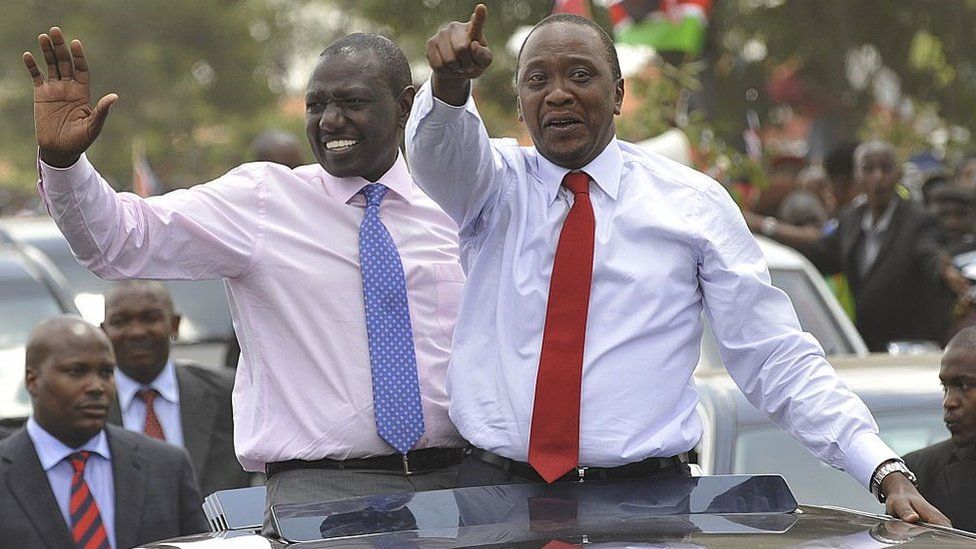
When Zambian president Frederick Chiluba threw his predecessor in jail in 1997, he was jerking up the relations between the two men to a new high. It had been going on for some time since the days before multiparty politics in the country. Kaunda was the head of state, and Chiluba was an uppity trade unionist wanting to challenge state authority.
Kaunda had given this pint-sized troublemaker a tour of jail a few times under the notorious preventive detention laws that many African rulers had armed themselves with to put out any dissent they faced.
Now the shoe was on the other foot, and Chiluba was anxious to use it as a boot to kick KK in the backside by making him taste a bit of his own medicine. To make it even tastier, he arrested him on Christmas Day, when any other day would have done just fine!
Julius Nyerere was so touched by this action and even more worried when his old friend went on a hunger strike that he asked for permission to visit KK in jail to convince him to eat. Chiluba allowed Nyerere to enter the jail, but on condition that the doors be locked behind him, lest KK escape!
This is an instructive story that informs politics on the African continent to this day. It has even come to cause thought to emerge within African governance discourses that it is the fear of being hunted down by their successors that renders many rulers refuse to vacate their offices once their terms come to an end. It has thus been suggested that there be some assurance or other that a former ruler will not be in any way made to account for his or her deeds when he or she was in office.
There have been other cases where new rulers have made those who ruled before them uncomfortable.
South Africa’s Jacob Zuma has been jailed on the watch of his successor Cyril Ramaphosa.
Angola’s second president Jose Edouardo dos Santos went to his grave before being reconciled with the third president, Joao Lourenco.
And so on and so forth.
Even where there are no exterior signs of dissension, subterranean tremors suggest that all is not well.
In Tanzania, it is well known that John Pombe Magufuli’s histrionics did not sit well with Jakaya Kikwete or Benjamin Mkapa, though they hardly uttered a word to criticise him for the exactions he was meting out to sections of the population.
Samia would like us to believe she is following in Magufuli’s footsteps, though some of us are seeing parallel tracks in the sand.
All the tensions we have noticed on the African continent between the incumbents and those who went before them do have explanations, though some are not very clear, especially those occurring between two individuals emanating from the same political organisation, such as the case in Angola, South Africa or Tanzania.
Individual styles and personal predilections seem to have precedence over parties, especially because what are called parties are nothing but empty shells set up merely to grab state power.
It is over the resources of the country and how they will be shared among the various postulants that battle lines are drawn, and the cut-throat competition this causes can be deadly indeed, both before and after the contest is settled one way or the other.
It is in this context that I worry about the elections in Kenya early in August. The campaigns and their fallout have been most extraordinary. That a sitting president and his (also sitting) vice-president can be in a bare-knuckle brawl in the public is certainly unprecedented, and, for me, it augurs ill for the near future of the country, whoever wins in the contest.
To say that there is bad blood between Uhuru Kenyatta and William Ruto would be the understatement of the decade; the two literally hate each other’s guts, and they have let the world know as much. Their rivalry has made a number of people wonder how their government works nowadays, seeing as they are both still in office until the new government is installed. Just what is happening?
Much of the world observing this contest will be scratching their collective head trying to comprehend this scenario and what it portends for Kenyans. Some will ask whether the 2010 Constitution really helped the Kenyans to bury the devastating hatchet we saw in the wake of 2007-08 when mobs of Kenyans butchered and set fire to each other with such abandon that it seemed Armageddon had arrived.
As I say above, I know it is the resources of the country over which these unseemly wars are being fought. In the end, there will be a victor and a loser.
It is to be hoped that somewhere in the collective psyche, there will be enough forbearance and resilience to allow the Kenyans to emerge out of this apparent chaos with their sanity intact.
You may like
-


Sad day for African football as promising Kenyan star passes on
-


Kenya’s ticketing startup BuuPass partners Flexpay for flexible travel payments
-
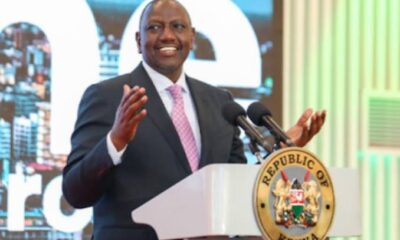

Outrage as Kenyan govt plans to tax content creators
-


7th Africa Tech Summit set to hold in Nairobi in February
-


SunCulture partners Turaco to empower Kenyan farmers with affordable climate insurance
-
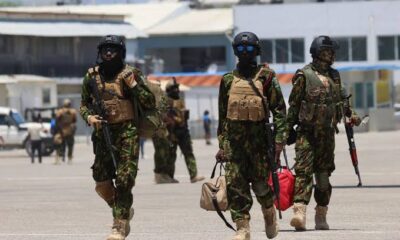

Kenyan police officers serving in Haiti resign over salary delays
Strictly Personal
Let’s merge EAC and Igad, By Nuur Mohamud Sheekh
Published
4 weeks agoon
November 27, 2024
In an era of political and economic uncertainty, global crises and diminishing donor contributions, Africa’s regional economic communities (RECs) must reimagine their approach to regional integration.
The East African Community (EAC) and the Intergovernmental Authority on Development (Igad), two critical RECs in East Africa and the Horn of Africa have an unprecedented opportunity to join forces, leveraging their respective strengths to drive sustainable peace and development and advance regional economic integration and promote the African Continental Free Trade Area (AfCFTA).
Already, four of the eight Igad member states are also members of the EAC and, with Ethiopia and Sudan showing interest, the new unified bloc would be formidable.
Igad’s strength lies in regional peacemaking, preventive diplomacy, security, and resilience, especially in a region plagued by protracted conflicts, climate challenges, and humanitarian crises. The EAC, on the other hand, has made remarkable strides in economic integration, exemplified by its Customs Union, Common Market, and ongoing efforts toward a monetary union. Combining these comparative advantages would create a formidable entity capable of addressing complex challenges holistically.
Imagine a REC that pairs Igad’s conflict resolution strengths with the EAC’s diplomatic standing and robust economic framework. Member states of both are also contributing troops to peacekeeping missions. Such a fusion would streamline efforts to create a peaceful and economically prosperous region, addressing the root causes of instability while simultaneously promoting trade investment and regional cooperation.
These strengths will be harnessed to deal with inter-state tensions that we are currently witnessing, including between Ethiopia and Somalia over the Somaliland MoU, strained relations between Djibouti and Eritrea, and the continually deteriorating relations between Eritrea and Ethiopia.
The global economy experienced as a result of the COVID-19 pandemic, compounded by the Ukraine war and competing global crises, has strained donor countries and reduced financial contributions to multilateral organisations and African RECs. Member states, many of which are grappling with fiscal constraints, are increasingly unable to fill this gap, failing to make timely contributions, which is in turn affecting key mandate areas of Igad and EAC, and staff morale.
A merger between Igad and EAC would alleviate this financial pressure by eliminating redundancies. Shared administrative systems, integrated programmes, and a unified leadership structure would optimise resources, enabling the new REC to achieve more with less. Staff rationalisation, while sensitive, is a necessary step to ensure that limited funds are channelled toward impactful initiatives rather than duplicative overheads.
The African Union (AU) envisions a fully integrated Africa, with RECs serving as the building blocks of the AfCFTA. A unified EAC-Igad entity would become a powerhouse for regional integration, unlocking economies of scale and harmonising policies across a wider geographical and economic landscape.
This merger would enhance the implementation of the AfCFTA by creating a larger, more cohesive market that attracts investment, fosters innovation, and increases competitiveness. By aligning trade policies, infrastructure projects, and regulatory frameworks, the new REC could serve as a model for others, accelerating continental integration.
The road to integration is not without obstacles. Political will, divergent institutional mandates, and the complexity of harmonising systems pose significant challenges. However, these hurdles are surmountable through inclusive dialogue, strong leadership, and a phased approach to integration.
Member states must prioritise the long-term benefits of unity over short-term political considerations. Civil society, the private sector, the youth, and international partners also have a critical role to play in advocating for and supporting this transformative initiative.
The time for EAC and Igad to join forces is now. By merging into a single REC, they would pool their strengths, optimise resources, and position themselves as a driving force for regional and continental integration. In doing so, they would not only secure a prosperous future for their citizens and member states but also advance the broader vision of an integrated and thriving Africa.
As the world grapples with crises, Africa must look inward, embracing the power of unity to achieve its potential. A combined Igad-EAC is the bold step forward that the continent needs.
Nuur Mohamud Sheekh, a diplomatic and geopolitical analyst based in London, is a former spokesperson of the Igad Executive Secretary. X: @NuursViews
Strictly Personal
Budgets, budgeting and budget financing, By Sheriffdeen A. Tella, Ph.D.
Published
1 month agoon
November 20, 2024
The budget season is here again. It is an institutional and desirable annual ritual. Revenue collection and spending at the federal, State and local government levels must be authorised and guided by law. That is what budget is all about. A document containing the estimates of projected revenues from identified sources and the proposed expenditure for different sectors in the appropriate level of government. The last two weeks have seen the delivery of budget drafts to various Houses of Assembly and the promise that the federal government would present its draft budget to the National Assembly.
Do people still look forward to the budget presentation and the contents therein? I am not sure. Citizens have realised that these days, governments often spend money without reference to the approved budget. A governor can just wake up and direct that a police station be built in a location. With no allocation in the budget, the station will be completed in three months. The President can direct from his bathroom that 72 trailers of maize be distributed to the 36 states as palliatives. No budget provision, and no discussion by relevant committee or group.
We still operate with the military mentality. We operated too long under the military and of the five Presidents we have in this democracy, two of them were retired military Heads of State. Between them, they spent 16 years of 25 years of democratic governance. Hopefully, we are done with them physically but not mentally. Most present governors grew up largely under military regimes with the command system. That is why some see themselves as emperor and act accordingly. Their direct staff and commissioners are “Yes” men and women. There is need for disorientation.
The importance of budget in the art of governance cannot be overemphasized. It is one of the major functions of the legislature because without the consideration and authorisation of spending of funds by this arm of government, the executive has no power to start spending money. There is what we refer to as a budget cycle or stages. The budget drafting stage within the purview of the executive arm is the first stage and, followed by the authorisation stage where the legislature discusses, evaluates and tinkers with the draft for approval before presenting it to the President for his signature.
Thereafter, the budget enters the execution phase or cycle where programmes and projects are executed by the executive arm with the legislature carrying out oversight functions. Finally, we enter the auditing phase when the federal and State Auditors verify and report on the execution of the budgets. The report would normally be submitted to the Legislature. Many Auditor Generals have fallen victim at this stage for daring to query the executives on some aspects of the execution in their reports.
A new budget should contain the objectives and achievements of the preceding budget in the introduction as the foundation for the budget. More appropriately, a current budget derives its strength from a medium-term framework which also derives its strength from a national Development Plan or a State Plan. An approved National Plan does not exist currently, although the Plan launched by the Muhammadu Buhari administration is in the cooler. President Tinubu, who is acclaimed to be the architect of the Lagos State long-term Plan seems curiously, disillusioned with a national Plan.
Some States like Oyo and Kaduna, have long-term Plans that serve as the source of their annual budgets. Economists and policymakers see development plans as instruments of salvation for developing countries. Mike Obadan, the former Director General of the moribund Nigeria Centre for Economic and Management Administration, opined that a Plan in a developing country serves as an instrument to eradicate poverty, achieve high rates of economic growth and promote economic and social development.
The Nigerian development plans were on course until the adoption of the World Bank/IMF-inspired Structural Adjustment Programme in 1986 when the country and others that adopted the programme were forced to abandon such plan for short-term stabilisation policies in the name of a rolling plan. We have been rolling in the mud since that time. One is not surprised that the Tinubu administration is not looking at the Buhari Development Plan since the government is World Bank/IMF compliant. It was in the news last week that our President is an American asset and by extension, Nigeria’s policies must be defined by America which controls the Bretton Woods institutions.
A national Plan allows the citizens to monitor quantitatively, the projects and programmes being executed or to be executed by the government through the budgeting procedure. It is part of the definitive measures of transparency and accountability which most Nigerian governments do not cherish. So, you cannot pin your government down to anything.
Budgets these days hardly contain budget performance in terms of revenue, expenditure and other achievements like several schools, hospitals, small-scale enterprises, etc, that the government got involved in successfully and partially. These are the foundation for a new budget like items brought forward in accounting documents. The new budget should state the new reforms or transformations that would be taking place. Reforms like shifting from dominance of recurrent expenditure to capital expenditure; moving from the provision of basic needs programmes to industrialisation, and from reliance on foreign loans to dependence on domestic fund mobilisation for executing the budget.
That brings us to the issue of budget deficit and borrowing. When an economy is in recession, expansionary fiscal policy is recommended. That is, the government will need to spend more than it receives to pump prime the economy. If this is taken, Nigeria has always had a deficit budget, implying that we are always in economic recession. The fact is that even when we had a surplus in our balance of payment that made it possible to pay off our debts, we still had a deficit budget. We are so used to borrowing at the national level that stopping it will look like the collapse of the Nigerian state. The States have also followed the trend. Ordinarily, since States are largely dependent on the federal government for funds, they should promote balanced budget.
The States are like a schoolboy who depends on his parents for school fees and feeding allowance but goes about borrowing from classmates. Definitely, it is the parents that will surely pay the debt. The debt forgiveness mentality plays a major role in the process. Having enjoyed debt forgiveness in the past, the federal government is always in the credit market and does not caution the State governments in participating in the market. Our Presidents don’t feel ashamed when they are begging for debt forgiveness in international forum where issues on global development are being discussed. Not less than twice I have watched the countenance of some Presidents, even from Africa, while they looked at our president with disdain when issues of debt forgiveness for African countries was raised.
In most cases, the government, both at the federal and state cannot show the product of loans, except those lent by institutions like the World Bank or African Development Bank for specific projects which are monitored by the lending institutions. In other cases, the loans are stolen and transferred abroad while we are paying the loans. In some other cases, the loans are diverted to projects other than what the proposal stated. There was a case of loans obtained based on establishing an international car park in the border of the State but diverted to finance the election of a politician in the State. The politician eventually lost the election but the citizens of the State have to be taxed to pay the loan. Somebody as “Nigeria we hail thee”.
Transformation in budgeting should commence subsequently at the State and federal level. Now that local government will enjoy some financial autonomy and therefore budgeting process, they should be legally barred from contracting foreign loans. They have no business participating in the market. They should promote balanced budget where proposed expenditures must equal the expected revenues from federal and internal sources. The State government that cannot mobilise, from records, up to 40 percent of its total budget from IGR should not be supported to contract foreign loans. The States should engage in a balanced budget. The federal government budget should shift away from huge allocations to recurrent expenditure towards capital expenditure for capital formation and within the context of a welfarist state.
Sheriffdeen A. Tella, Ph.D.
EDITOR’S PICK
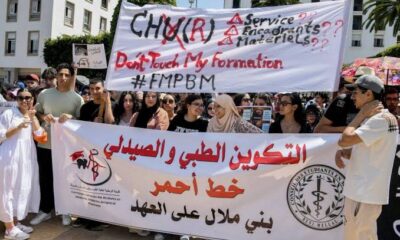

Moroccan doctors stage nationwide protest in ‘Week of Anger’
Moroccan doctors across the country on Tuesday staged a nationwide protests in what is known as “Week of Anger,” accusing...


Zambian drug agency declares ex-President Lungu’s daughter wanted
The Zambian Drug Enforcement Commission (DEC) has declared the daughter of former president Edgar Lungu, Tasila Lungu, wanted in connection...


‘Pray for leaders to serve you diligently,’ President Tinubu tells Nigerians
President Bola Tinubu has called on Nigerians to develop the habit of praying for their leaders to enable them serve...


World Bank doubts Ethiopia-IMF debt assessment
Some officials of the World Bank have questioned if the study supporting Ethiopia’s debt restructuring may be “faulty” after criticising...
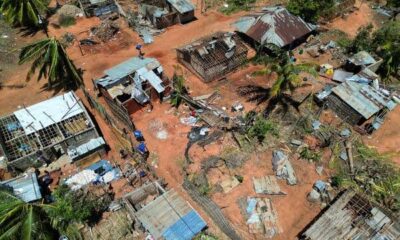

Death toll from Cyclone Chido in Mozambique hits 94
he death toll from the Cyclone Chido which stuck Mozambique last week has risen to 94 with hundreds still missing....


Facebook returns to Uganda after 4-year ban
After four years of being in the cooler as a result of suspension by government, Facebook, now Meta, is making...


Nigeria on the right path despite hardship, criticism— President Tinubu
Nigerian President, Bola Ahmed Tinubu, has insisted that the country is moving in the right direction despite the criticism of...


Zambian NGO decries persistent corruption, says governance in 2024 marked by mixed fortunes
A Non-Governmental Organization in Zambia, the Gender Organizations Coordinating Council (NGOCC), has decried what it described as persistent corruption in...


Sad day for African football as promising Kenyan star passes on
he African football fraternity was thrown into mourning following the untimely demise of promising Kenyan striker, Ezekiel Otuoma, who died...
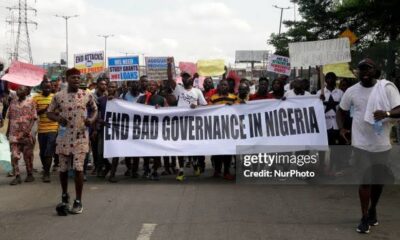

Nigeria: Police dismiss Amnesty Intl’s report on killing of protesters, demand apology
The Nigeria Police has rejected a report by Amnesty International that accused the force of killing protesters during the #Endbadgovernance...


